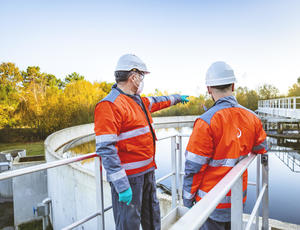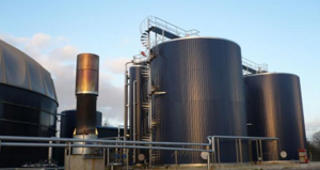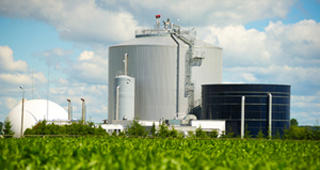The ultimate valorization of biogas to biomethane
Overview
Biogas is a valuable source of renewable energy. It is produced by anaerobic purification of industrial wastewater, anaerobic digestion of sewage sludge and other organic waste, and the fermentation of organic material in covered landfills.The latter can serve as natural gas substitute being injected into the natural gas grid or serve as a green fuel for vehicles (bioCNG or bioLPG).
Converting biogas into biomethane involves three main steps: pretreatment, compression and methane separation.
How MemGas works:
The biogas is pretreated in the drying and cleaning step to remove unwanted components such as hydrogen sulfide (H2S), volatile organic compounds (VOC) and water (H2O).
After compression to 12 to 16 bar it passes through the high pressure gas separation membranes.
The membranes are arranged in cylindrical cartridges installed in a patented three-stage set-up.
The performance of each plant is optimized to produce pure biomethane (97 to 99% CH4) within the requirements of our customers, with the lowest environmental impact and an optimized CAPEX/OPEX ratio.

Features and Benefits
- Suitable for flow rates from 30 to 10,000 Nm³/h raw biogas.
- Up to 99.5% efficiency.
- Stop/start of plant within a few minutes.
- High flexibility for fluctuation in biogas flow and composition.
- One megawatt-hour of produced biomethane avoids 0.22 tons of CO2 emissions.
- Compressor heat recovery for enhanced energy balance.
- Low energy consumption of 0.3 to 0.4 kilowatt-hour to a normal cubic meter (kWh/Nm3) raw biogas.
- Possible bio-CO2 recovery for applications in food industry or greenhouse use.
- Possible combination of bio-CO2 with hydrogen to produce synthetic CH4 making the efficiency greater than 100%.
Applications
Services
We offer a complete range of services to meet your exact requirements for your water treatment facilities:
Local service teams for technical service and operational support, to ensure highest availability.
Contact
Renewable energies provide an answer to many of the environmental challenges we face today, including climate change, the depletion of resources and the collapse of biodiversity. And biogas is one renewable energy option for which demand is rapidly growing on a global scale. The attraction of biogas is that it equals energy independence as it is storable in the network and it can be produced close to the consumption areas. It really is a whole circular economy system that can be set up around a mechanization project.

Marie Esteve
Sales and tender manager at Biothane
FAQ about MemGas™
How is organic waste used to produce energy?
In the biogas plant, organic waste can be converted into environmentally friendly fuel. In such a plant, biomass digesters convert these materials into biogas, which serves as an efficient fuel for energy production. This can then be used to meet a site's energy needs and/or fed into the gas grid.
How can we better utilize biogas as part of the global energy mix?
Renewable energies provide an answer to many of the environmental challenges we face today, including climate change, the depletion of resources and the collapse of biodiversity. And biogas is one of our renewable energy options that is rapidly growing on a global scale. In fact, IRENA statistics on global electricity generation from biogas show that it grew 90 percent between 2010 and 2016 and this continues.
Is MemGas a safe process?
At Veolia we consider a healthy and safe environment — for our employees and for the end users — as our foremost responsibility. The MemGas technology has been designed following Veolia standards in the design and engineering of biogas processes, which comply beyond the scope of global regulations as applied for municipalities or industries.
Case Studies

Aptunion, a French company specializing in ingredients for the food industry, needed to ensure the sustainability of its site by reducing environmental and operating cost while increasing the capacity of their plant for production of more green energy. To meet their needs, they awarded Veolia Water Technologies to design and install an additional treatment plant using Biobed® Advanced EGSB, Sulfothane™, and MemGas™ technologies, thus allowing them to treat 1,600 m3 of wastewater per day while producing 200 Nm3 of biogas per hour.

The Val Estérel Mediterranean Agglomeration Community, strongly committed to the energy transition of its territory, has entrusted Veolia Water Technologies subsidiary, OTV Sud, with the implementation of a methanization unit based on MemGasTM technology and the valorization of biogas into biomethane at the Reyran water treatment plant in Fréjus.

In 2019, The Nice Côte d'Azur Metropolis, strongly committed to the ecological transition, inaugurated its innovative and future-oriented wastewater treatment facility christened "Aeris". Designed with capacity of 160,000 equivalent habitant this plant located in Cagnes-sur-Mer converts its sludge into green energy by injecting biomethane into the GRDF network and valorises the available heat and energy at each stage of its process thus making it the first wastewater treatment plant in France with a positive energy balance.









